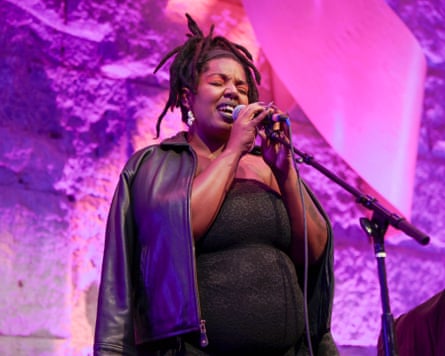KeiyaA had been grinding in New York’s experimental jazz and hip-hop scenes for a good six years before her 2020 debut album, Forever, Ya Girl. Self-released on Bandcamp to make some cash while couchsurfing, the record totally shifted her life’s course. A low-key yet potent swirl of bedroom pop, R&B and electronic music that zeroed in on feelings of solitude and uncertainty, it struck a chord with critics at tastemaker sites such as Pitchfork and the Fader and became one of the year’s defining underground records.
It also allowed her to tour the world; at the same time, the 33-year-old producer, singer and multi-instrumentalist born Chakeiya Richmond immediately began to feel the pressure of following it up, stress compounded by the end of a toxic relationship. “I was like, at worst, [the follow-up] has to be just as good. At best, it has to be better. How am I gonna do that? When you put that expectation on yourself, you’re not actually gonna meet that,” she says, sitting on the patio of a London cafe. Having struggled with depression her whole life, she experienced a renewed, debilitating spell. “There was the survival mode loop of like, couch rotting, bed rotting, having to work up [the energy] to take care of myself in general, let alone get to the computer to make music.”
KeiyaA also noticed that she was changing herself to meet expectations. “There was a difference between the way I would dress myself than what I would accept when I was styled by someone,” she says. KeiyaA brings up the heavy tan shirt dress she wore to play NPR’s Tiny Desk Concert. “I’m grateful for the women who helped me find that dress, but I think I also felt like: I’m a fat woman and they’re trying to cover me up. I want to be snatched – I tend to wear clothes that are close to my body and black, and I like to show off my tattoos. When I watched [footage of] that Tiny Desk, I was like, ‘What am I wearing?’”
In the blazing sun, KeiyaA is the picture of an ascendant off-duty star: her peach sunglasses, long curly black hair and tattooed arms make her hard to miss. She punctuates long, thoughtful ideas about life and art with peals of soft laughter. At the same time, she speaks with the openness of someone unwilling to put up armour in order to inure herself to the indignity and intensity of the music industry.
Today she recognises that part of her was trying to capitulate to her community – her then-boyfriend was in the underground rap scene – and the teachers she had worked with when studying jazz at university. “I wanted neo-soul, hip-hop, rap greats to respect it – I wanted people like Madlib to respect my production,” she says, between sips of her flat white. “Forever, Ya Girl was 100% me, but I also feel like there was a part of me that was trying to prove something to the elders. To show a certain type of respectability, or something. I’m still figuring that out.”
KeiyaA’s second album Hooke’s Law is, at its core, about shaking off those expectations and finding a way to make music that’s free and totally intrinsic to her experience. Her first release for big-budget indie label XL Recordings, it is an odyssey of jazz, pop, experimental composition and club music which she wrote and produced single-handedly. Hooke’s Law is a dense, rewarding listen: tempos melt and crystallise; the lyrics can be raw and ragged or totally raging, and they’re often jabbed by terse samples or abrupt beat switches. It is an expansive, tightly constructed album that many will hail as the album of the year.

For a while, KeiyaA felt that she should be grateful for any attention she received. Born on the south side of Chicago, she was a musician from a young age. The jazz musicians she had grown up around taught her that “the gig starts when you step foot in the venue – when you communicate to your fans and to the crowd and staff you are in performance mode.”
That mode of thinking could only go so far. After the release of Forever, Ya Girl, she had to contend with the idea that people suddenly thought of her as KeiyaA the indie star, rather than the human being Chakeiya. “Then I noticed it kept extending further and further past the gig. Now I’m outside getting some ice-cream – ‘Are you KeiyaA?’” she says. “Or like, at a party where I just want to shake ass with my friends, but now ‘KeiyaA’s at this party’ – especially if I’m with friends who are also famous, it’s like ‘KeiyaA and Kelela are at this party’, and people are staring, and suddenly you have a meet-and-greet line forming around you. I just want to shake my tail feather.”
Interacting with her new fandom sometimes felt depersonalising, as if she had to meet expectations of who “KeiyaA” was; that pushing back would have negative repercussions for her career. “On my travels, people would constantly [say things] like ‘Oh, you’re actually really sweet and quiet and childlike.’ I’d be like, well, what did you expect? ‘We expected you to be very serious, kind of like a diva, very commanding’,” she recalls. “People expect me to be this sage, measured; everything I say is a profound one-liner. I’m like, it took me days to write those lyrics, guys!”
A lot of the songs on Hooke’s Law deal with this newfound attention, as well as the difficulties of knowing whose interest in her was genuine. “I’m over here like, ‘I just wanted to be loved and accepted. Anybody want to love me? Hello, I’m worthy of love, guys!’ and people being like, ‘I want what you have’, or ‘I’m really inspired by you’, and me being like, OK, I’ll take that,” she says. Sometimes, what she thought was a mutual desire for connection turned out to be more one-sided. “If someone’s asking for something, I’m gonna help them – but then you notice over time, like, ‘Oh, you copied and pasted that sound, where’d you get that sound from? I read your interview and you were inspired by the film that I showed you.’ But it’s like, I hate even noticing it! These things sound so silly.”
It was around 2022 that KeiyaA began properly engaging with making music again. Experimenting with Auto-Tune allowed her to depersonalise the process. She likens it to “stepping into a mecha suit” – the kind of robot suit a superhero might use to fight a powerful enemy. By 2023, she was ready to force herself to snap out of her creative fugue. “I was like, what are you gonna do? Try to make something purposely for someone else’s approval? What would that even sound like?” she says. She turned her frustrations into an album whose lyrics say literal fuck-yous to landlords, insincere actors and violent colonial histories. “I definitely looked to the way punk expresses anger, the way metal expresses all the shit deeply, the way goth music expresses sadness and longing and desire, to inform the way I channelled those feelings.”
Those influences had been in KeiyaA’s head for a long time; Hooke’s Law doesn’t sound like nu-metal, but it pays tribute to the nu-metal-head she was as a teen. “There was a part of me that really related to the white male hubris of nu-metal stuff as a teenager – a lot of those bands were from the midwest, trailer park, hood and speaking about their emotions in a very simple way,” she says. “At the time, I didn’t really know that they were reinterpreting Black sounds and inspired by hip-hop, which is why I was like, OK, intellectually, I’m not gonna have as strong of a relationship with this music – it felt like a betrayal to me as a Black queer woman. But I listened to it again recently and I’m like, this shit still hits.” She has been thinking about trying to write in conventional pop structures, inspired by the melodic US indie-rock band Pinback. “Historically, I’m a goth – I either love the girls or, like, really hard, punk metal music.”
That is KeiyaA’s MO right now: trying hard to accept that the ideas she once held about all aspects of her life may be more mutable than they once seemed. When she was in the depths of her depression after the release of Forever, Ya Girl, she spiralled, thinking that maybe life wasn’t worth living if she couldn’t find clear answers for everything. And then, one day, she asked herself: “Really? Are you sure?” she recalls. “I was like, did you die? No. It hurts really bad. It’s really hard, it’s weird, it may be something you hold for ever. But did you die? No!”

 3 months ago
53
3 months ago
53

















































